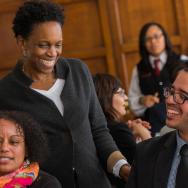For many students, the possibility of a career in academia is never presented as an option.
Such was the case for the University of Chicago’s Emily Bock. While growing up in Chicago’s Uptown neighborhood, the concept of becoming a lifelong scholar never occurred to her. That changed when she became an undergraduate at Barnard College, where her academic advisors encouraged her to apply to the Mellon Mays Undergraduate Fellowship (MMUF)—a research development and mentoring program that aims to increase faculty diversity in higher education.
Founded more than three decades ago, the MMUF has two primary goals: to increase the number of students from underrepresented groups who pursue Ph.D. programs, and to support the pursuit of Ph.D.s by other students who demonstrate a commitment to increasing representation among faculty in the academy.
This past June, Bock defended her dissertation in anthropology—an ethnographic investigation of the underground ballroom dance scene in Chicago and New York. Today, she is a UChicago postdoctoral teaching fellow in the social sciences, gender and sexuality studies, and critical race and ethnic studies. Bock largely credits MMUF with leading her down an academic path.
“Mellon allowed me to develop as a scholar and teacher,” said Bock, AM’15, PhD’21. “And the program works. It proves that by investing in underrepresented scholars individually and financially, you have the potential to change the academy from the inside out.”
Currently the longest-running program funded by The Andrew W. Mellon Foundation, the MMUF launched in 1988 with just eight schools, including UChicago. Today, 48 colleges and universities and three academic consortia host the MMUF, which integrates comprehensive mentoring and cohort-based community-building opportunities into the student experience along with its core research component. Over the course of its 33-year history, more than 1,000 MMUF program alumni have earned Ph.D.s.
“Unlike many similar programs, MMUF emphasizes the importance of working intensively but on a small scale,” said Elise M. LaRose, an academic adviser in the College who has co-led MMUF at UChicago since 2002 as its program director. “Once admitted, we mentor Mellon Mays students closely for two full years. We’re selecting students who demonstrate a genuine passion for research whom we believe will contribute innovative scholarship and change the academy over time.”
Each participating institution tailors the MMUF program to fit its unique culture. LaRose and Assoc. Prof. Travis A. Jackson—an alum of the program who now serves as its faculty director at UChicago—work together to create opportunities that encourage community building among MMUF students. They also teach students how to build strong mentoring relationships with faculty.
UChicago students interested in pursuing a Ph.D. in Mellon-designated fields—which include a range of disciplines in the social sciences and humanities—apply to MMUF during their second year of undergraduate study. If admitted, they begin the program the summer before their third year with the Mellon Summer Research Training Program (SRTP), a nine-week residential research development program. As third-years, students work closely with MMUF’s directors and attend weekly seminars, social gatherings, and workshops. The following summer, students conduct independent research for their bachelor’s theses.
During the program’s final year, students continue participating in weekly cohort activities, researching their theses, and preparing applications to Ph.D. programs. Students also attend professional conferences throughout the course of the program and participate in the annual MMUF Regional Undergraduate Conference, which gives them an opportunity to present their research and get feedback from peers.
The cohort model and research preparation resources offered by MMUF have a significant impact, especially for underrepresented students who might otherwise feel isolated in academia. Paola Del Toro, AB’20, is a MMUF program alum who is now pursuing a Ph.D. in English at Princeton University. She learned about the program during her first year from a fellow student who was already enrolled in MMUF. Del Toro attended an on-campus MMUF information session and decided to apply to the program. She credits MMUF with transforming her research experience.
“It’s hard to describe how much further the research goes when you don’t have to worry how you’re coming across as a woman or as a Latina, because everyone else is in the same boat,” Del Toro said. “It can be easier to talk about research within a group of other people of color.”
“We’re a very tight-knit group,” said Camrick Solorio, AB’21, who learned about MMUF through the College Center for Research and Fellowships. “Before the pandemic, we would have meals together weekly. Then last year we were always talking on Zoom or FaceTime. It was very important for all of us to have a strong support group.”
In addition to building community among their cohorts and the broader MMUF network, students learn how to develop close and productive working relationships with UChicago faculty throughout the duration of the program. For Solorio, developing a close relationship with a MMUF faculty mentor gave him guidance on the rigorous demands of an academic career.
“Working with faculty mentors through this program is worlds apart from just being a College student,” Solorio said. “Mellon challenges and encourages us to explore whatever our interest is on the academic pathway. My mentor, Michael Fisch, has been amazing. He introduced me to the research area we’re both involved in, and now I'm in a completely different place than I was a couple of years ago, thanks to him.” Solorio is currently pursuing professional and research opportunities in technology and digital media prior to applying to graduate school.
The experience is valuable to faculty as well. For Fisch, an associate professor of anthropology and of social sciences in the College, it provides an opportunity to work closely with students on their research over an extended period.
“In every class, several students show a real inclination to academic thought. They have the ability to pursue things well beyond the classroom,” said Fisch, whose research intersects sociocultural anthropology and science and technology studies. “When you come across a student like Camrick, who has such a genuine intellectual curiosity, Mellon affords the opportunity for them to cultivate their research and analytic skills in order to contribute to a broader conversation.”
MMUF alumni almost always remain connected to the program. Bock has worked with the UChicago MMUF program since 2014, first as an SRTP research mentor and preceptor and, more recently, as the instructor for the SRTP’s social theory course, Engaged Scholarship.
“As a graduate student, I have been amazed by how many Mellon alums I have met at UChicago and at conferences,” Bock said. “I still keep in touch with my Mellon faculty mentor, friends, and former students. I love seeing what they're doing now.”

